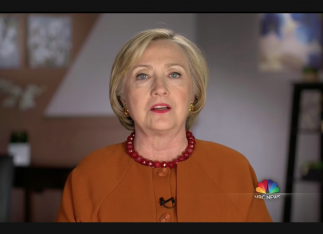 During FBI Director James Comey’s testimony before the House Committee on Oversight and Government reform he testified that Hillary Clinton’s FBI interview was not recorded. He also told Congress that there was no written transcript of the interview. With Comey’s emphasis on transparency in this case, many are probably wondering why Clinton’s interview was not recorded. Here is why.
During FBI Director James Comey’s testimony before the House Committee on Oversight and Government reform he testified that Hillary Clinton’s FBI interview was not recorded. He also told Congress that there was no written transcript of the interview. With Comey’s emphasis on transparency in this case, many are probably wondering why Clinton’s interview was not recorded. Here is why.
In 2014, then-Attorney General Eric Holder announced a new policy for the FBI, DEA, ATF and U.S. Marshals Service that required certain interviews and interrogations to be video-recorded.
This was a major change federal law enforcement agencies. Prior to the introduction of this new policy, federal investigators, particularly at the FBI, had a great deal of reluctance about recording interviews. A recent Harvard Law Review article described this reluctance, stating “internal DOJ analysis suggests that the policy actually inhibited agents’ ability to exercise discretion regarding whether or not to record their own interviews, and created a “heavy presumption” against recording.”
The law review article further explains:
The major federal law enforcement agencies strongly resisted recording interrogations, citing fears that recording would interfere with rapport building, lay juries and judges would misinterpret acceptable interviewing techniques as improper, and the implementation would be logistically difficult.
These concerns led agencies to erect barriers to electronic recording and to rely instead on note-taking and agent memory. For example, the FBI’s standard procedure was for an agent to take notes during the interview and later compile a summary known as a Form 302.
When then-AG Holder announced the new policy he said it merely created a presumption in favor of recording statements, but it was not a mandatory requirement.
“The Department of Justice is instituting a sweeping new policy … which will take effect on July 11th, [2014] creates a presumption that statements made by individuals in federal custody … will be electronically recorded,” Attorney General Holder said at the time, according to a Department of Justice press release. “This presumption in favor of recording applies to statements made by individuals in the custody of the FBI, the DEA, the ATF, and the United States Marshals Service. It allows for certain exceptions—such as when the interviewee requests that the recording not occur or when recording is not practicable.
The first thing to note about the new DOJ policy is that it only applies to individuals who are in federal custody, meaning those who are detained and held by federal authorities. There is no question that Clinton was never in “federal custody,” so the recording requirement likely would not apply to her situation.
Secondly, Director Comey did confirm that the FBI agents completed a Form 302 for Clinton’s interview and further explained that is currently classified at the highest level, TS/SCI. Director Comey’s reluctance to answer certain questions during the “open” hearing, along with the fact that 110 emails in 52 email chains existed on Clinton’s server, provides an understanding as to why her Form 302 is classified. Moreover, the discussion of the extremely sensitive material found on Clinton’s server — not to mention the evidence that foreign governments almost certainly breached her email account — likely provides an additional basis for why her interview was not recorded. The DOJ allows an exemption to the recording requirement in matters involving national security.
Finally, the recording requirement can be waived at the request of the interview subject. In all likelihood, Clinton’s attorneys negotiated the terms surrounding her “voluntary interview” and included a requirement that it would not be recorded.
One final note — the fact that Clinton was not “under oath” during her interview is essentially irrelevant. As Director Comey clearly stated at the hearing today, an interview subject does not have to be under oath for it to be a crime to lie to an FBI agent. He further stated that they developed no evidence that she lied during her FBI interview. Whether she lied before Congress is a separate matter.